TORONTO (Dec. 10) — In the years since they last won the Stanley Cup, and though not returning to the championship round of the National Hockey League, the Toronto Maple Leafs have strung together a number of winning and undefeated streaks. It is entirely plausible, however, that the current string of 18 games, dating from Nov. 2 to Dec. 8, is the high–water mark of the post–1967 era; that the Leafs are performing more efficiently than during any five–week stretch since the start of the 1967–68 schedule and the advent of NHL expansion.
Since coughing up a three–goal lead at the Honda Center in Anaheim on Oct. 30, losing, 4–3, to the Ducks in overtime, the Maple Leafs have soared to a 13–1–4 record, accruing 30 of 36 points in the standings. Only once has the club been defeated in regulation time, losing, 4–2, to Pittsburgh at Scotiabank Arena on Nov. 11. Inexplicably, with all its top–end forward talent, the team has dropped four overtime encounters while playing three skaters aside. Otherwise, it’s been near perfection for the Blue and White in a stretch that can stand alongside any in franchise history. More significantly, it’s not that the Leafs are winning; after all, this iteration of the club has performed quite marvelously in the regular season since Auston Matthews came aboard as the No. 1 draft selection in 2016. Rather, it’s how the Leafs are prevailing; oddly overcoming a spate of injury to their defense unit that, logic suggests, should have derailed performance and results. Instead, the club has put forth its most–thorough systemic display in recent memory, permitting just 24 opposition goals in the 11 matches since last losing, to the Penguins, in regulation: an 8–0–3 run that has Toronto near the apex of the NHL overall standings.
The most–recent triumph, a 5–0 whitewash of the Los Angeles Kings here in town, actually flattered the visitors. Though the Kings are not at the level of the Maple Leafs, they were simply overwhelmed by the home club’s speed and tenacity throughout the lop–sided affair. It provided an example of how the Leafs have performed, almost exclusively, since the Honda Center embarrassment on the night before Halloween. That Toronto has maintained such an extraordinary level of play without blue–liners Morgan Rielly, Jake Muzzin and T.J. Brodie (who returned against L.A. after a 12–game absence) is difficult to fathom. During the era of Matthews, William Nylander, Mitch Marner and John Tavares, skill and scoring ability has accounted for virtually all hot streaks. Yes, the club did receive exceptional goaltending from Jack Campbell (now struggling with Edmonton), who amassed a superb 47–12–7 mark in 66 appearances between Jan. 16, 2020 and Apr. 26, 2022. But, domination from the Big 4 up front — highlighted by Matthews’ 60–goal season a year ago — earmarked most of the club’s success.
That pattern has continued through the first half of the current schedule; Marner, before tonight’s home game against Calgary, recording points in 21* consecutive matches, three more than any skater in franchise history. Matthews, though not scoring at the clip of last season, has heated up with five goals in the past six games (14 on the season). Nylander has 15 goals in 28 matches, well on pace to equal or surpass his career high of 34 from last season. Captain Tavares, commensurate with his time in a Toronto uniform, is producing at nearly a point–per–game pace, with 27 in 28 starts. So, yes, the Leafs are still soaring on the wings of their $40 million forwards.
* Marner, tonight, extended his streak to 22 games.
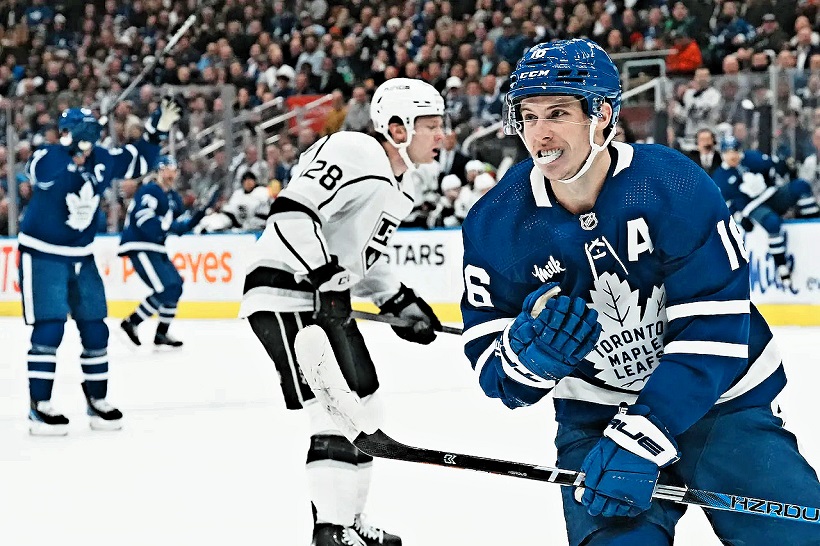
MITCH MARNER EXTENDED HIS FRANCHISE–RECORD POINTS STREAK TO 21 GAMES WITH A GOAL AGAINST THE LOS ANGELES KINGS ON THURSDAY NIGHT. CHRIS YOUNG THE CANADIAN PRESS
But, the structural posture of the team has undergone a remarkable mutation during the 13–1–4 surge. For the first time since Roger Neilson coached the club between 1977 and 1979, the Leafs are winning with a defensive mode. Neilson was a proponent of tight checking and conservative play behind center ice. His club of 1977–78 accrued the second–most points (92) in Leaf annals to that time, while hacking 48 goals from its allowance of the previous year. Perhaps unsurprisingly, the Leafs advanced to the Stanley Cup semifinals for the first time since 1967, ousting Los Angeles and the New York Islanders before falling to Montreal. In the ensuing years, impressive regular seasons have evolved, primarily, from the brilliance of center Doug Gilmour; the stout goaltending of Curtis Joseph and the scoring exploits of the current Big 4. At no time since the brief reign of Neilson have the Leafs been considered a defensive force. Precisely how (and why) the club has evolved in that direction over the past month is a sizable credit to coach Sheldon Keefe, yet not easily explained. Particularly in the absence of Rielly, Muzzin and Brodie, leaving the ancient Mark Giordano and mistake–prone Justin Holl to carry a staggering load.
True, Giordano, 10 months prior to his 40th birthday, is playing superbly, akin to his Norris Trophy season in 2017–18 with Calgary. Given his age, the added responsibility could take a toll as the season progresses, but he’s been a kingpin over the past five weeks. Holl, perhaps motivated by Giordano, hasn’t fumbled with the puck as he routinely did before. Such unheralded performers as Alex Kerfoot, David Kampf, Pontus Holmberg, Zach Aston–Reese and Victor Mete have taken turns compensating for the depleted roster; none looking out of place. And, most essentially, goaltending has provided the equalizing force, also in the throes of injury. Ilya Samsonov (1.88 goals–against average in 10 games), Erik Kallgren (2.67 in 10 games) and Matt Murray (2.34 in nine outings) have combined for a 2.29 team average in 28 matches, second only to Boston’s mark of 2.12. The Leafs are scoring at 3.12 goals per match. A rather simple recipe for success. Until the second half of last season, Campbell provided similar assurance between the pipes. The free agent additions of Samsonov (from Washington) and Murray (from Ottawa) have, thus far, been a pleasant discovery for Toronto’s fifth–year general manager, Kyle Dubas.
All of this, of course, is a cautionary tale.
No matter how efficiently the Leafs function during the regular schedule, they will be assessed, solely, by playoff results. No club in the NHL has more on the line, starting in mid April, than the Leafs. Not after bowing on six consecutive occasions in the opening fray of Stanley Cup toil. In that regard, timing could be adversarial. If the Leafs are performing similarly on Apr. 10 of next year, expectation for a long playoff march will soar, regardless of the past six failures. Goaltending and defensive posture nearly always prevail in the Stanley Cup tournament. But, the playoffs are still more than four months in the distance. Are the Leafs deep enough; aggressive and consistent enough to not only advance to the second round for the first time since 2004, but to survive four rounds of grueling competition? There is no stretch of regular–season play that can answer that question for Toronto. Even if the club, right now, more resembles a playoff juggernaut than, arguably, at any time in the post–1967 era.
FROM THE VAULT
Official game programs in my hockey collection:
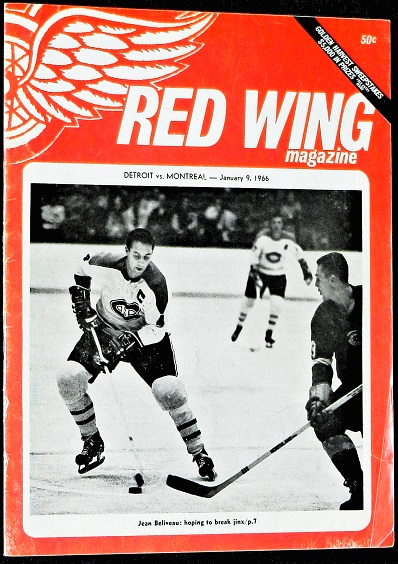
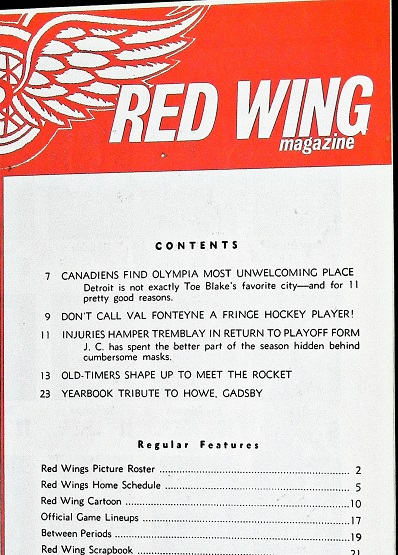
JAN. 9, 1966 — MONTREAL at DETROIT: The clubs that would meet for the 1966 Stanley Cup (line–ups, below) clashed at Olympia Stadium just after the new year. And, the club that would win the Stanley Cup for the second consecutive spring lost, 4–2. Third–period goals by future Leafs Paul Henderson and Norm Ullman lifted the Red Wings over the Canadiens. Ron Murphy and Doug Barkley had the other Detroit goals; Gilles Tremblay and former Leaf Dick Duff scored for Montreal. Roger Crozier had a big night in goal, stopping 40 shots for the win. Charlie Hodge took the loss. Art Skov officiated the match with linesmen Brian Sopp and Neil Armstrong.
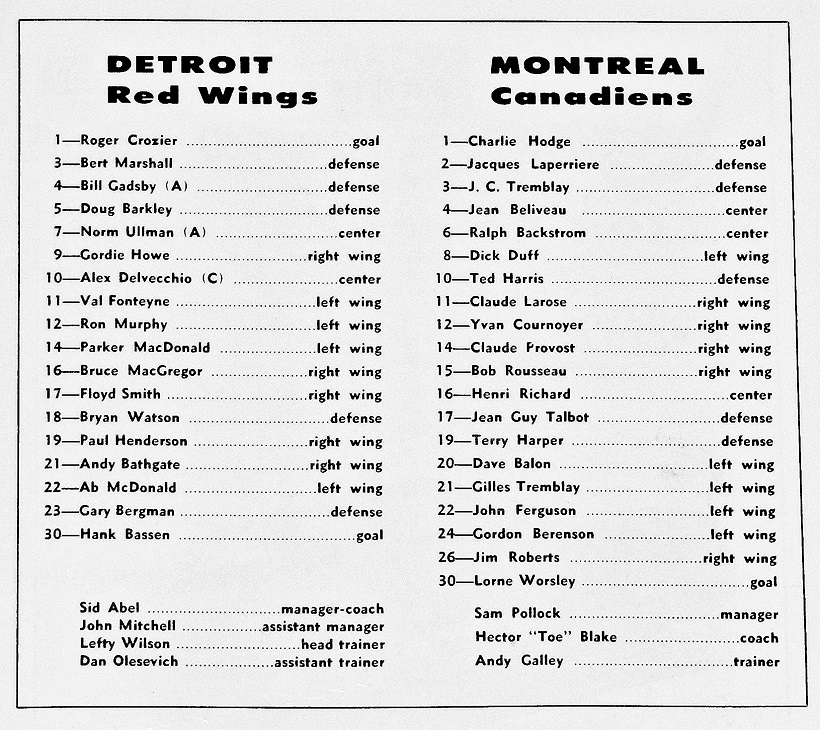
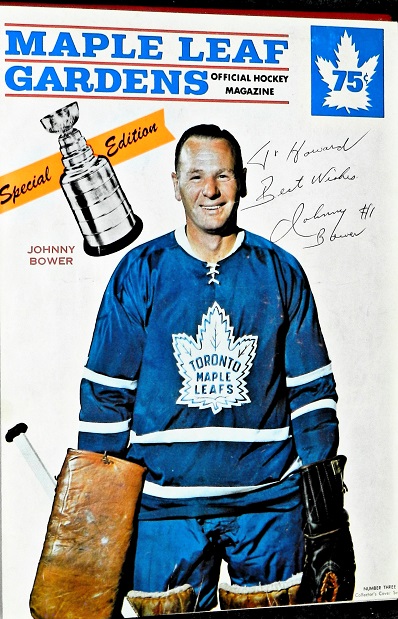
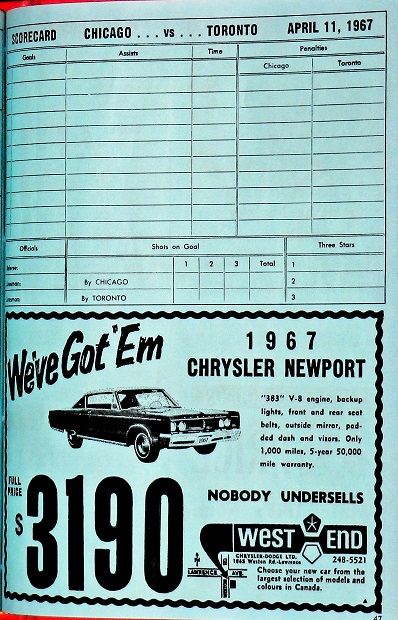
APR. 11, 1967 — CHICAGO at TORONTO: It was Canada’s Centennial year (as per the design of the line–ups centerspread, below) and the Maple Leafs were en route to winning the most–improbable of their 11 Stanley Cups. On this night, it was Game 3 of the semifinals against the heavily favored Black Hawks. The clubs had split the first two matches at Chicago Stadium. Back home, the Leafs built a 3–0 lead after two periods on goals by Ron Ellis, Frank Mahovlich and Jim Pappin. Bobby Hull ruined a shutout attempt by Terry Sawchuk with Chicago’s lone tally (on the powerplay) at 16:30 of the third. Toronto took the lead in the series and would not again trail, eliminating the Black Hawks in six. Each club had 36 shots; Glenn Hall took the loss for Chicago. Art Skov was the referee, working with linesmen Matt Pavelich and Brent Casselman. Johnny Bower signed the cover of the program (top–left) when I visited his Mississauga, Ont. home in May 2016. He died at 92 in December 2017.
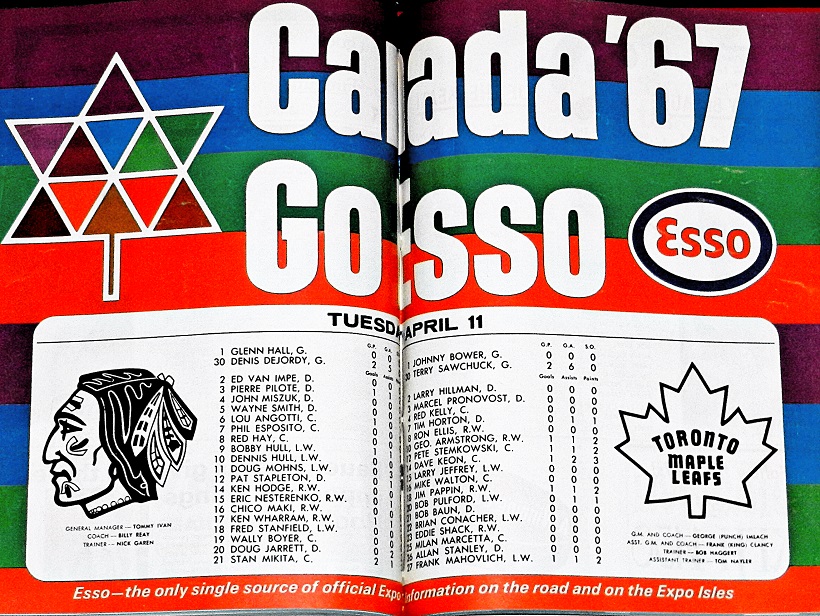
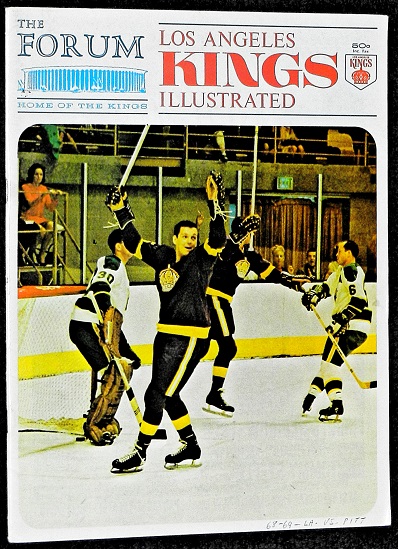
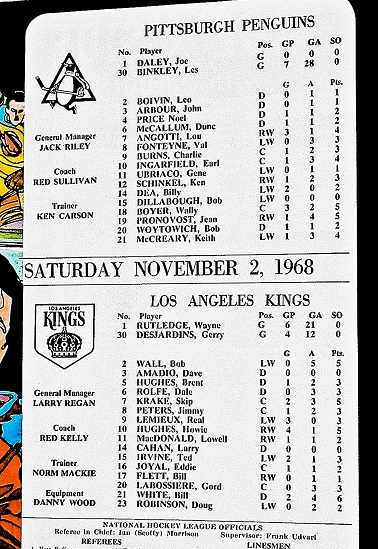
NOV. 2, 1968 — PITTSBURGH at LOS ANGELES: In the second season of the expanded NHL (from six to 12 teams), the Penguins and Kings met at the Los Angeles Forum (program cover and line–ups, above). A powerplay goal by Bill Flett at 7:59 of the third period was the difference in a 3–2 Kings victory. Defencemen Dale Rolfe and Bob Wall had given L.A. a 2–0 lead. Jean Pronovost and Earl Ingarfield scored for Pittsburgh. Los Angeles outshot the Penguins, 36–20, making it a busy night for losing goalie Les Binkley. Rookie Gerry Desjardins had an easier time for the win. Lloyd Gilmour officiated the match with linesmen Pet Shetler and Claude Bechard.
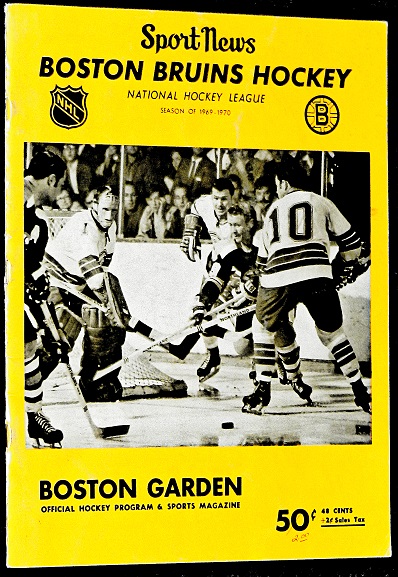
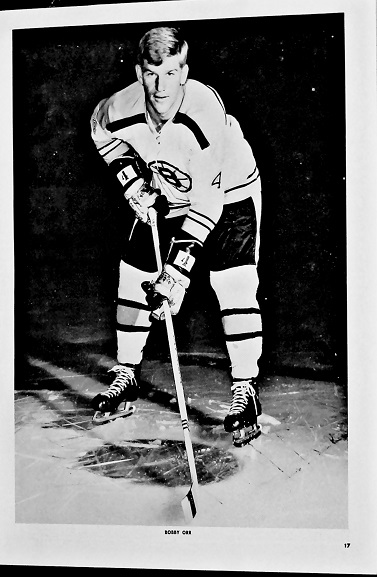
DEC. 14, 1969 — PITTSBURGH at BOSTON: Bobby Orr was hockey’s premier star nearing the midway point of the 1969–70 NHL season. He would later score his iconic overtime goal against St. Louis to win the Stanley Cup for the Bruins. On this December eve, the Pittsburgh Penguins visited Boston Garden (program cover above; line–ups, below). The overmatched Penguins gave the Bruins quite a battle and led, 1–0, late in the first period on a goal by Ken Schinkel. But, Derek Sanderson and Gary Doak then struck for Boston in a 1:05 span and the Bruins had a 2–1 lead… which they nursed through the scoreless second and third periods. Former Leafs goalie Al Smith played well for Pittsburgh, stopping 38 shots. Ed Johnston made 29 stops for the win. Don Awrey (Boston) and Bryan Hextall fought at 17:01 of the second period (Hextall’s son, Ron, would play goal for Philadelphia in the 1980’s and 90’s). John Ashley was the referee; Ronn Finn and Ed Butler, the linesmen.
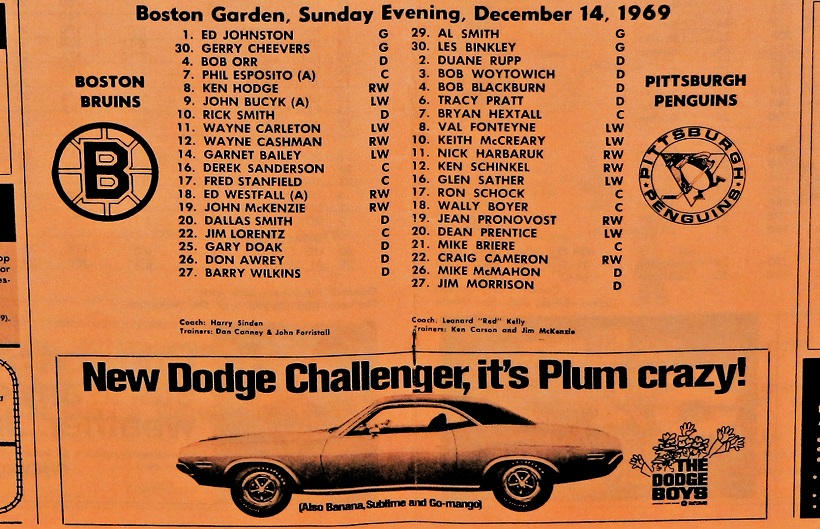
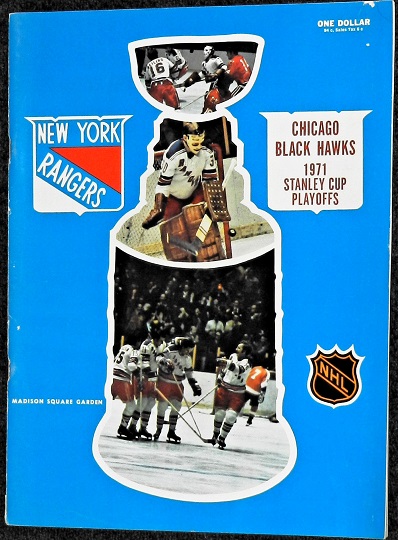
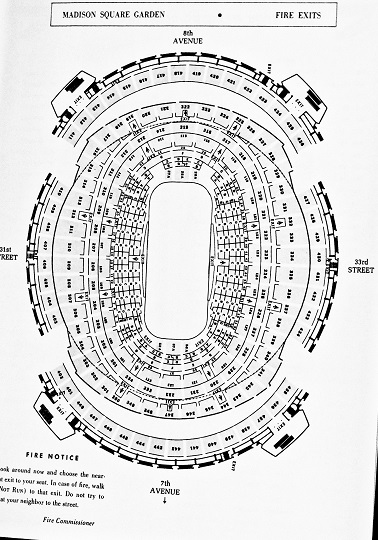
APR. 29, 1971 — CHICAGO at NEW YORK: This, at the time, was one of the longest–ever Stanley Cup playoff games, a triple–overtime affair that former Leaf Peter Stemkowski decided at 1:29 of the third extra frame, knotting the semifinal series with Chicago at 3–3 (program, above; line–ups, below). Jean Ratelle scored early in the third regulation period to tie the score, 2–2. Tony Esposito and Ed Giacomin then took turns performing marvelously. When the dust settled, New York had outshot the Black Hawks, 49–26, at Madison Square Garden. Dennis Hull and Chico Maki provided the visitors a 2–0 lead; Rod Gilbert and Ratelle replied for the Rangers in regulation. Both clubs killed off tripping minors in the second overtime — to Tim Horton of New York and Pat Stapleton of Chicago. Bruce Hood refereed the match with linesmen Claude Bechard and John D’Amico. Chicago won the series at home in Game 7, then lost to rookie Ken Dryden and the Montreal Canadiens in the Cup final.
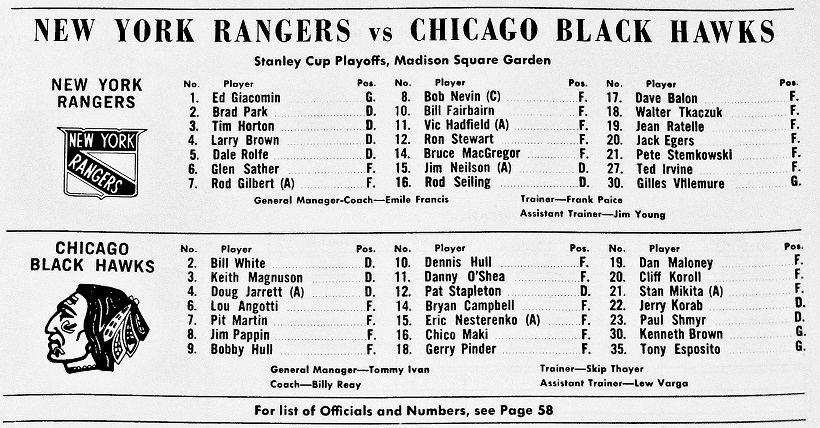
EMAIL: HOWARDLBERGER@GMAIL.COM




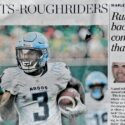



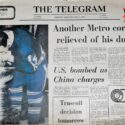






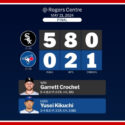

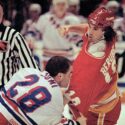
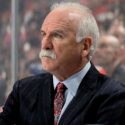

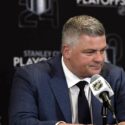

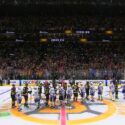
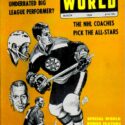
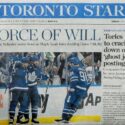






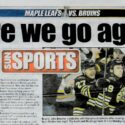


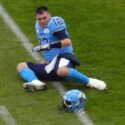

Howie
This is besides the point but when you post pages from old programs I always end up looking at the ads. I’d love to see a post dedicated to just ads of 60s and 70s. Maybe during a slow hockey week in the summer.
Cars, alcohol, cigarettes… all the good stuff.
Been there, done that. But, I’ll do it again. For you.
Toronto may be winning, but I do not see them playing dominant hockey. Most of the victories could have gone the other way. Tonight, they were lucky to get the win over Calgary.
Let see how they do against Boston at home before planning the parade. I still think Toronto has to move on from Coach Keefe.
Excellent post. I still want to see one more junkyard dog up front and a big heavy defenceman at the back. Also, what does Kerfoot have to do to be knocked off the lineup? He’s the most irritating passenger out there.
There’s a maturation and commitment to team defense in these Leafs that I haven’t seen in decades. But Cup winners get meaningful minutes and consistent production from all four lines. The bottom six remains the Leafs’ Achilles heel, and a significant upgrade is a prerequisite to a long playoff run next spring.
Great stuff Howard. This Leafs team deserves tonnes of credit, up and down the lineup through to coaching and management. However – there’s always a “however” – can Dubas, Keefe and company take this team over the hump? They haven’t done it yet. All will be judged in the spring, and that success is NOT to be measured by winning one round in the playoffs. Stanley Cup or nothing.